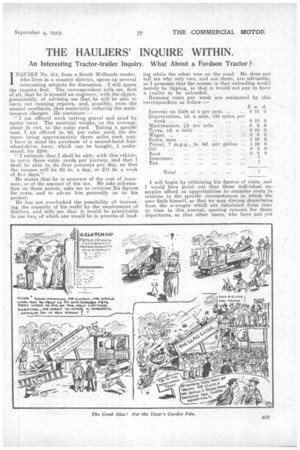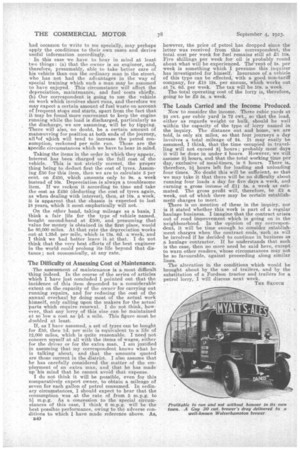THE HAULIERS' INQUIRE WITHIN.
Page 21

Page 22

If you've noticed an error in this article please click here to report it so we can fix it.
An Interesting Tractor-trailer Inquiry. What About a Fordson Tractor ?
INQUIRY No. 211, from a South Midlands reader, who lives in a country district, opens up several interesting subjects for discussion. , I will quote the inquiry. first. The correspondent tells me, first of all, that he is himself an. engineer, with the object; presumably, of advising me that he will be able to carry out running repairs,. and, possibly, even the annual overhauls, thus materially reducing the main
tenance charges. He continues :— , " I am offered work carting gravel and sand by motor lorry. The material weighs, on the average, about 24 cwt. to the cubic yard. Taking a specific case, I am offered ns. 9d. per cubic yard, the distance being approximately three miles each Way. I have in mind the purchase of a second-hand fourwheel-drive lorry, which can be bought, I understand, for £500.
" I estimate that I shall be able, with this vehicle, to carry three 'cubic yards per journey, and that I shall be able to do four journeys per day, so that the income will be £2 5s. a day, or £11 5s. a week of five days." He states that he is unaware of the cost of insurance, or of the amount of the tax. He asks information on those points, asks me to criticise his figures for costs,"and to advise him generally as to his project.
He has not overlooked the possibility of increasing the capacity of his outfit by the employment of frailers, and tells me that it would be practicable to use two, of which one would be in process of load.
ing while the other was on the road. He does not tell me why only two, and not three, are advisable, so I presume that the reason is that unloading would merely be tipping, so that it would not pay to have a trailer, to be unloaded:
Running costs per week are estimated by this correspondent as follow :— I will begin by criticising his figures of costs, and I would here point out that these individual examples afford us opportunities to consider costs in relation to the specific circumstances in which the user finds himself, so that we may discuss departures from the averages which are tabulated from time to time in this journal, quoting reasons for those departures, so that other users, who have not yet had occasion to write to me specially, may perhaps apply the conditions to their own cases and derive useful information accordingly.
In this case we have to bear in mind at least two things (a) that the owner is an engineer, and, therefore, presumably, able to take better care of his vehicle than can the ordinary man in the street, who has not had the advantages in the way of special training which such a man may be assumed to have enjoyed. This circumstance will affect the depreciation, maintenance, and fuel costs chiefly. (b) Our correspondent is going to use the vehicle on work whichinvolves short runs, and therefore we may expect a certain amount of fuel waste on account of frequent stops and starts, apart from the fact that it may be found more convenient to keep the engine running while the load is discharged, particularly as the discharge; we are assuming, will be by tipping. There will also, no doubt, be a certain amount of Manoeuvring for position at both ends of the journey, aIl 'of w.hich will tend to increase the petrol consamption, reckoned per mile run. Those are the specific circumstances which we have to bear in mind.
Taking the items in the order in which they appear, Interest has been charged on the full cost of the vehicle. This is not strictly correct, the proper thing being to deduct first the cost of tyres. Assuming 50 for this item, then we are to calculate 5 per cent. on ,E450, which amounts only to 9s. a week instead of 10s. Depreciation is always a troublesome item_ If we reckon it according to time and take the cost as 45() (deducting the cost of tyres again, as when dealing with interest), then, at 10s. a week; it is apparent that the chassis is expected to last 18 years, which it most emphatically will not.
On the other hand, taking mileage as a basis, I think a fair life for the type of vehicle named. bought second-hand at £500, and presuming that value for money is obtained in the first place, would be 80,000 miles. At that rate the depreciation works out at 1.25d. per mile, which is 13s. 6d. a week, and think we had better leave it at that.. I do not think that the very best efforts of the best engineer in the world could prolong its life beyond that distance; not economically, at any rate.
The Difficulty ot Assessing Cost of Maintenance.
The assessment of maintenance is a most difficult thing indeed. In the course of the series of articles which I have just concluded I pointed out that the incidence of this item depended to a considerable extent on the capacity of the owner for carrying out running repairs, and for reducing the cost of the annual overhaul by doing most of the actual work himself, only calling upon the makers for the actual Parts which require renewal. I do not think, however, that any lorry of this size can be maintained a L so-low a coat as id. a mile. This figure must be doubted at least.
If, as I have assumed, a set of tyres can be bought for £50, then -id. per mile is equivalent to a life of 12,000 miles, which is quite reasonable. I need not concern myself at all with the items of wages, either for the driver or for the extra man. I am justified in assuming that my correspondent knows what he is talking about, and that the amounts quoted
i are those current n the district. I also assume that he has carefully considered the matter of the employment of an extra man, and that he has made up'his mind that he cannot avoid that expense.
I do not think it will be possible, even for this 'comparatively expert owner, to obtain a mileage of seven for each gallon of petrol consumed. In ordinary circumstances, I should expect to hear that the consumption was at the rate of from 5 m.p.g. to 51 m.p.g. As a concession to the special circumstances of this case, I think 6 m.p.g. will he the best possible performance, owing to the adverse conditions to which I have made reference above. As,
however, the price of petrol has dropped since the letter was received from this correspondent, the total cost per week for fuel remains still at 41 10s. Five shillings per week for oil is probably round about what will be experienced. The-rent of 5s. per week is something which I presume this inquirer has investigated for himself. Insurance of a vehicle of this type can be effected, with a good non-tariff company, for 12s. per annum, which works out at 7s. ed. per week. The tax -will be 10s a week. The total operating cost of the lorry is, therefore, going to be Xa 5s. a week.
The Loads Carried and the Income Produced.
Now to consider the income. Three cubic yards at 24 cwt. per cubic yard is 72 cwt., so that the load, either as regards weight or bulk, should be well within the capacity of the typo of lorry named in the inquiry. The distance out and home, we are told, is only six miles, so that four journeys a day involves a total mileage of 24. It may easily be assumed, I think, that 'thetime occupied in travelling will not exceed g hours; probably most days it will be done in under 2 hours. However, we will assume 21 hews, and that the total working time per day,exclusive of meal-times, is 8 hours. There is, therefore, 5i hours left for loading and unloading four times. No doubt this will be sufficient, so that we may take it that there will be no difficulty about running four loads a day for five days a week, and earning a gross income of En 5s. a week as estimated. The gross profit will, therefore, be £2 a week, out of which there may be certain establishment charges to meet. There is no mention of these in the inquiry, nor is it stated whether this work is part of a regular haulage business. I imagine that the contract arises out of road improvement which is going on in the neighbourhood. In the opinion of my correspondent, it will be time enough to consider establishment charges when the contract ends, such as will be involved if he decided to continue in business as , a haulage contractor. If he understands that such is the case, then no more need be said here, exceptto warn other readers, whose circumstances may not be so favourable, against proceeding along similar lines.
The alteration in the conditions which would be brought about by the use of trailers, and by the substitution of a Fordson tractor and trailers for a petrol lorry, I will discuss next week.




























